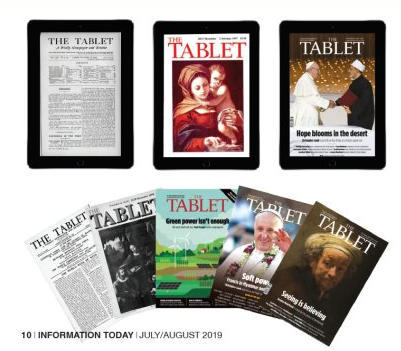INSIDER'S PERSPECTIVE
The Academic Value of Large Archives
by Thomas Rodenby
 In the modern market of information overload and rapid consumption, magazines battle against social media and television for the eyes and attention span of readers. The average life span for fledgling titles is short if they fail to garner the necessary readership to sustain themselves. To survive, magazines need a sound marketing strategy, excellent production value, and most importantly, unique and engaging content. But even with these in place, they must deal with editorial staff changes, funding issues, and the challenge of remaining relevant. The life of a magazine is far from smooth sailing. In the modern market of information overload and rapid consumption, magazines battle against social media and television for the eyes and attention span of readers. The average life span for fledgling titles is short if they fail to garner the necessary readership to sustain themselves. To survive, magazines need a sound marketing strategy, excellent production value, and most importantly, unique and engaging content. But even with these in place, they must deal with editorial staff changes, funding issues, and the challenge of remaining relevant. The life of a magazine is far from smooth sailing.
After traversing these obstacles, any magazine that reaches the decade mark should be applauded. But what about those rare titles that reach the fabled century mark? When a journal has survived multiple generations of readers, it transcends its genre, opening an aperture into our shared cultural history.
THE POWER OF AN ARCHIVE
Let us look at The Tablet archive, which was recently developed at Exact Editions. It dates to 1840 and includes more than 8,500 issues. At first glance, some readers might discount the title, thinking that it is strictly related to the Roman Catholic Church; however, it holds immense value as a historical record. Skimming through the years, you are able to get a sense of the prevailing attitudes during the world wars, the real-time impact of technological developments, and how new legislation and social movements changed the path of humanity.
When used in an academic format, giant magazine archives offer readers both resource types: primary and secondary. The most recent issues, while often commenting on current affairs, also offer fresh opinion and analysis of historical events. And yet, in the same reading experience, users can delve into the archived issues and see the same historical event as it was perceived by somebody living in that time period.
Regular periodicals are unique in this sense, and it is an aspect of their format that is sometimes overlooked. The frequency of editorial content and the immediacy of the publishing industry mean that we are given snapshots of the past in concise and opinionated articles that are lacking in longer, more researched formats such as books or case studies. This is perfect for researchers who are seeking to immerse themselves in the time period and gain a contemporary understanding of a particular movement or event.
THE NEED FOR DIGITAL PRESERVATION
Digital preservation is also important in its own right. Unlike the safeguarding of old print issues, which involves keeping precious documents in controlled conditions and away from the hands of the public, digital documents revive the materials and open them up to new viewership. Once created, a digital archive should be maintained in perpetuity, assuming it has the right platform for circulation and continuous demand for the content. This is where publishers and libraries must work together to preserve these important resources.
Publishers must continue to make moves toward digitizing their archives in user-friendly formats—all of those issues in storage in the basement constitute a revenue reservoir. On the library front, the industry must continue this momentum toward transitioning resources to digital where possible—obviously, within budget limitations and considering other factors—and this will invigorate the publishing industry to do its part. |